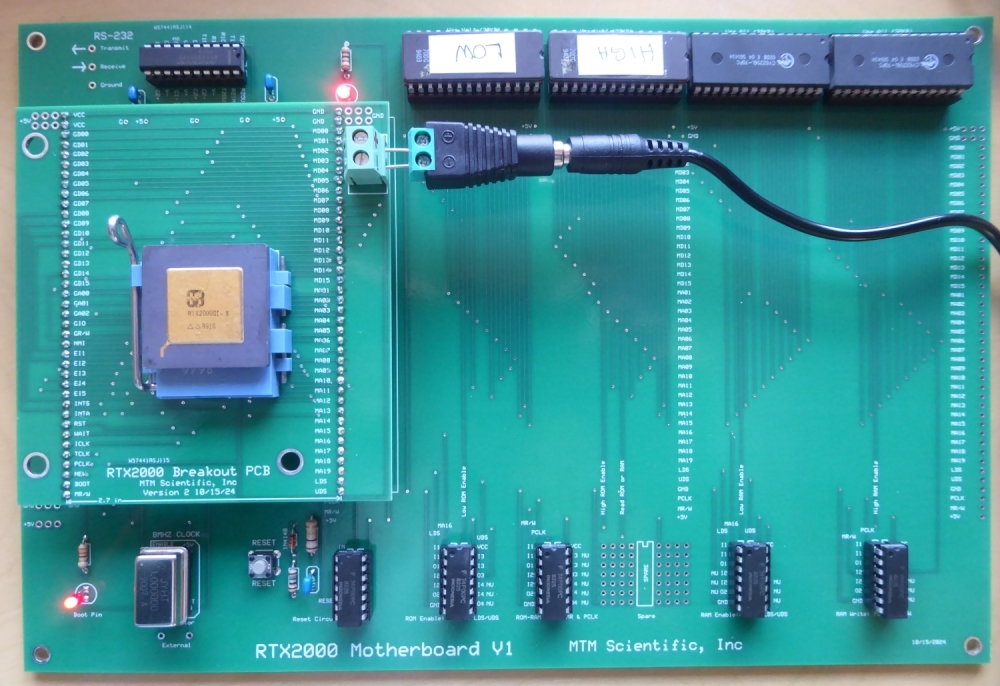RTX2000
Stack Computer Development Board
MTM
Scientific, Inc

Figure 1: RTX2000 Stack Computer Development Board
The RTX2000 CPU from Harris Semiconductor is a stack-based
hardware Forth engine. The RTX CPU family consists of 3 major
versions: RTX2000, RTX2001 and RTX2010. This CPU has been used on
numerous Space-Related
Missions since production release in 1988. The RTX is a
descendant of Chuck Moore's Novix CPU. Our interest in the CPU started
with the extensive description provided by Koopman in his book Stack
Computers.
We have previously experimented with our own stack computer designs,
notably: TTL-Retro
and LALU. Our
RTX2000 Development Board began when we obtained several vintage
samples of the CPU on EBAY. (The CPUs have limited availability.) We
endeavored to create a development board over the course of about 1
year, as detailed in our posts at ANYCPU.ORG
Designing a basic development board was a challenging project for
several reasons. Documentation for the RTX2000 CPU is scattered across
the internet. It has been especially difficult finding examples of
circuit schematics. Fortunately we did find a draft copy of the Harris
Semiconductor RTX Programmers Handbook and the RTX2000
Data Sheet.
We decided to create a basic development board to experiment with the
RTX2000 CPU. The main challenges were providing memory (ROM and RAM), a
1 MHZ clock oscillator, and a UART circuit for RS-232 serial
communication. Because the CPUs are rare, as are the compatible
ZIF sockets, we incorporated a reusable carrier card. The intent has
been to make the carrier card reusable with working revisions of the
motherboard. Our intent was to create a simple development board
for understanding and exploring the RTX2000 architecture and opcodes.
The RTX2000 is a 16 bit microprocessor with dual stacks: Data &
Return. The instruction set of the 16 bit opcodes is very rich, with
integral provisions for calling and returning from subroutines. Many of
the RTX opcodes directly translate to Forth primitives.
Additional Forth words are easily incorporated as subroutines,
coded in assembly. We spent a large amount of time and effort
researching and understanding the RTX2000 opcodes. We used our
knowledge of the opcodes to hand assemble a simple Monitor program
residing in ROM on the development board. The Monitor program is
primarily a proof-of-principle application demonstrating: 1) Functional
CPU, 2) Working UART and 3) Working Memory.
Our goal is to facilitate additional exploration of the RTX Stack
Machines. Given the scarcity of hardware related to the device, we have
decided to offer our RTX2000 Development Board for purchase. Our hope
would be that development continues, and that together we can create
the hardware and software to fully utilize the RTX family. With
that in mind, we have created a documention package to start.
Here is the MTM
Scientific RTX2000 Development Package.
Please contact us if you are interested in purchasing an MTM RTX2000
Development Board. Obviously, the supply is limited.
Michael
September, 2025

